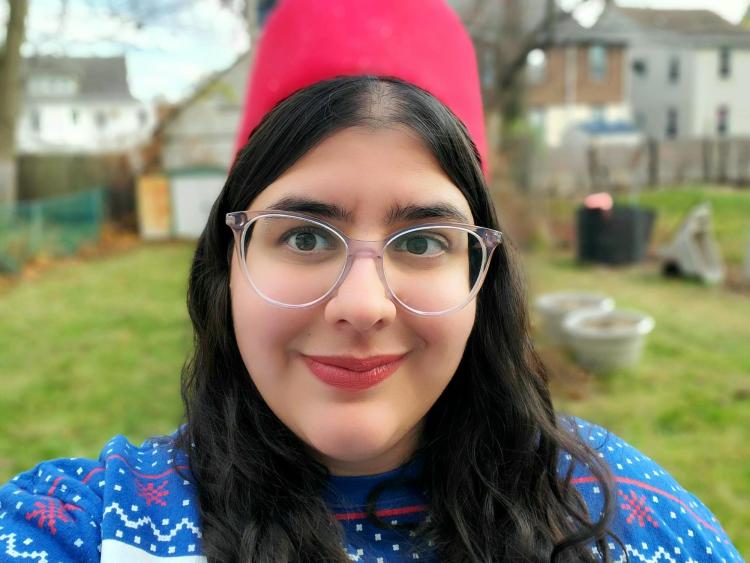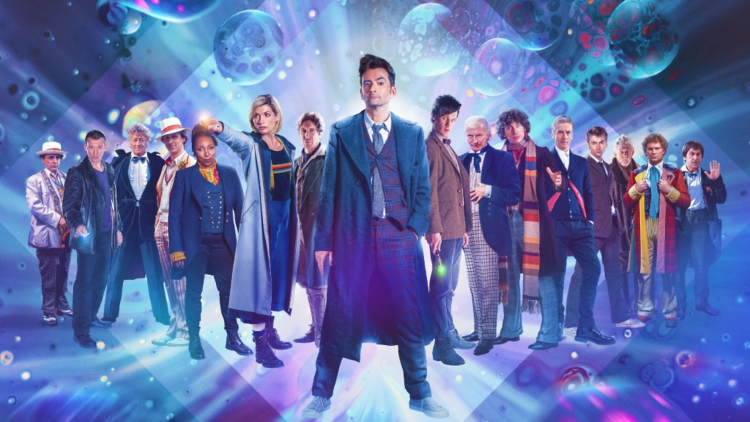After six decades, who knew? Whovians, that's who
Doctor Who turns 60 this year and CU Boulder scientist, alumna and ‘Whovian’ super fan attributes the BBC show’s success and staying power to its relatable protagonist and strong plotlines
When the TV show Doctor Who debuted in November 1963 on the British Broadcasting Corp., critics were notably muted.
In retrospect, perhaps a show about a humanoid alien with two hearts who travels the galaxy in a ship disguised as a police phone booth, fights killer robots and uses something called a “Sonic Screwdriver” as a go-to gadget for fixing things was always going to be an acquired taste. Yet, despite a very limited special-effects budget in the show’s early years and multiple cast changes, Doctor Who has persevered to become the longest-running science fiction-themed TV show, according to Guinness World Records.
One person who is not surprised by the show’s success is Emily Nocito (PhDEnvSci’23), who has watched the TV series for nearly 20 years, has been a panelist at several Doctor Who conventions and was once interviewed by the BBC as a recognized expert on activities associated with Doctor Who gatherings.

CU Boulder graduate Emily Nocito (PhDEnvSci’23) has watched Doctor Who for nearly 20 years, has been a panelist at several Doctor Who conventions and was once interviewed by the BBC as a recognized expert on Doctor Who fandom. She is pictured wearing a fez, which was popularized by the 11th doctor on the TV show.
Nocito says she started watching Doctor Who while in middle school, growing up in New Jersey.
“It was something that I could watch with my parents; it was something that was of interest to two different generations,” she says. As her interest in the TV show grew, she found herself attending Comic Cons in New York and events specific to Doctor Who.
Recently, ColoradoArts and Sciences Magazine spoke with Nocito about what first attracted her to the show, why she believes the show has maintained its popularity through the years, how she feels about being called a “Whovian” and the effect Doctor Who has had on her decision to pursue a career in science. Her answers were lightly edited for style and condensed.
Question: What was it about the TV show that attracted you to it?
Nocito: For a show that is about aliens, it is so humanistic. One minute it can be silly and then terrifying and then emotional—and it really has everything you could want in a show. You can be laughing in one episode and just sobbing your way through the next.
That’s something that I honestly haven’t found with any other show, is that element of real humanity to it. In the character of the Doctor, you have this alien—mythical, magical almost—being who has seen all of time and space, and is thousands of years old, and yet still causes a lot of problems. He has flaws, but most times he strives to be the best version of themselves.
I also think the show attracts people who might feel a bit different, a bit alien. I think one thing Doctor Who has done a pretty good job of, compared to other shows, is in terms of representation. Whether that is queer representation, or someone with a disability, or a different health diagnosis, the key thing is that they are represented but not tokenized.
Question: Guinness World Records has stated that Doctor Who is the longest-running science fiction show. Why do you think that is?
Nocito: I think it’s really the storytelling. The running joke with the show is that one of the bad guys of the Doctor Who universe since the beginning of the series was the Daleks. And to be absolutely honest, it looks like some guy in a costume that is made for a school play, and he’s holding toilet plunger. And that’s your big, bad guy.

Over the show's 60-year (and counting) run, the character of Doctor Who has been played by many actors. (Image: BBC Studios)
Still, the story lines are so compelling that it somehow makes up for the lack of special effects—especially back in the early days of the show. It’s somehow endearing and almost campy. …
I think it’s really through the storytelling, plus the fans’ passion for the show, that have kept Doctor Who going for all of those years. It’s a community that I would argue is probably unmatched. Maybe the Trekkies (Star Trek fans) have us beat, but I would almost argue Whovians have the hottest take.
That being said, there’s always at least a few Trekkies dressed up who show up at Doctor Who conventions, usually as Red Shirts. And usually, the Red Shirts are in the background. We see them.
I just love that. I think there’s such harmony between all of the different sci-fi communities that we can all appreciate each other’s love and passion for the shows.
Question: The TV show has evolved over the years, with several different actors playing the title character. In your interactions with fans, are they accepting of the changes with the show—including new Doctors—or are there some purists who cling to the original shows, like with some Star Trek fans?
Nocito: There are some people who have problems with (changes). So, for example, when (actress) Jodi Whitaker took over the role, we had our first canonically female Doctor. In the new season that will start soon, we will have a person of color playing the Doctor.
Every group has its trolls. There are some people who don’t like change.
My thing is: If you have a problem with one Doctor, you can find a different two-hearted fictional Doctor to like. Calm down, it’s just character. …
I find that the people that I associate with embrace it. We embrace inclusivity. We embrace that what Doctor Who stands for is a space that should make everyone feel safe and seen, and is the best part of humanity, put through just a silly sci-fi lens.
Question: Fans of Doctor Who are sometimes referred to as Whovians. Do you mind if someone calls you a Whovian? Also, is it fair to say you are a super fan of the show?
Nocito: I don’t mind at all. For me, it’s an identifier. I am a Whovian; I am very proud of that.
And to me, what’s so interesting is, if people watch the show, they naturally want to talk about the show, things like, who is your favorite Doctor? What companion do you like? What companion do you hate? And it’s just open for debate, and obviously subject to personal preference.
But everyone has a favorite. Everyone has their first Doctor. Everyone has their own origin story how they got started with the show. At the end of the day, the important thing is that you’re here, and you are Whovian. And that’s the community. …
I’m innately curious. I really like complex problems. And that’s also something I’ve seen in every iteration of the Doctor, of tackling complex problems while also wanting to make tangible impact on things.”
Yes, I would categorize myself as a super fan. When I speak about Doctor Who (at conventions), I often do it in context of Doctor Who, Sherlock and the TV show Supernatural, because they all have smart plotlines. And with all three, you’ll find yourself getting invested in the characters. You have characters who are smart, but they have their faults, and they are very relatable. (The three TV shows) are kind of this holy trinity of dorkiness and geeky-ness, and I love that.
Question: Did watching Doctor Who have anything with your deciding to pursue the sciences?
Nocito: In a more abstract sense, yes. I’m innately curious. I really like complex problems. And that’s also something I’ve seen in every iteration of the Doctor, of tackling complex problems while also wanting to make tangible impact on things.
Also, in my case, I study the oceans, which I would argue is almost equally mysterious as other universes. …
I’ve made some amazing connections through Doctor Who. There was a TV show called Torchwood that was a spinoff of Doctor Who, and I was waiting in line to see the premier of it in New York City. The line was really long, and to pass the time, some of us were chatting.
One of the people I was standing next to was actually a student at the college that I wanted to attend. She was able to get me into one of her classes as a visiting high schooler. They gave me a tour of the campus and I got to meet other people she was hanging out with, including some people in the Science Fiction Club.
I would have never met her in a million years if I hadn’t stood in line for this spin-off of this British show that had been on the air since before I was born. It was such an interesting coincidence that she was attending the college that was my top choice. And I ended up going there, to Stony Brook University on Long Island.
Some of the most amazing people that I’ve met—including other scientists—I’ve only met because of this show.
Editor’s note: Recently, Nocito was named a Knauss Fellow through the National Oceanic and Atmospheric Administration (NOAA). In February, she will start a yearlong fellowship with NOAA in Silver Spring, Md., focused on U.S. implementation of U.N. work focused on conservation in the high seas, which was the focus of her dissertation.
Question: Do you have any advice for anyone who hasn’t watched Doctor Who and is on the fence about watching it?
Nocito: I challenge everyone to give it a try. Just give it a watch. Start pretty much anywhere—any first episode of a season. It’s not difficult to catch up in the plot lines. That being said, if you’re dedicated, you’ve got 60 years’ worth of shows to watch. So, if you really like binging shows, boy do I have one for you.
Did you enjoy this article? Subscribe to our newsletter. Passionate about arts and sciences? Show your support.

